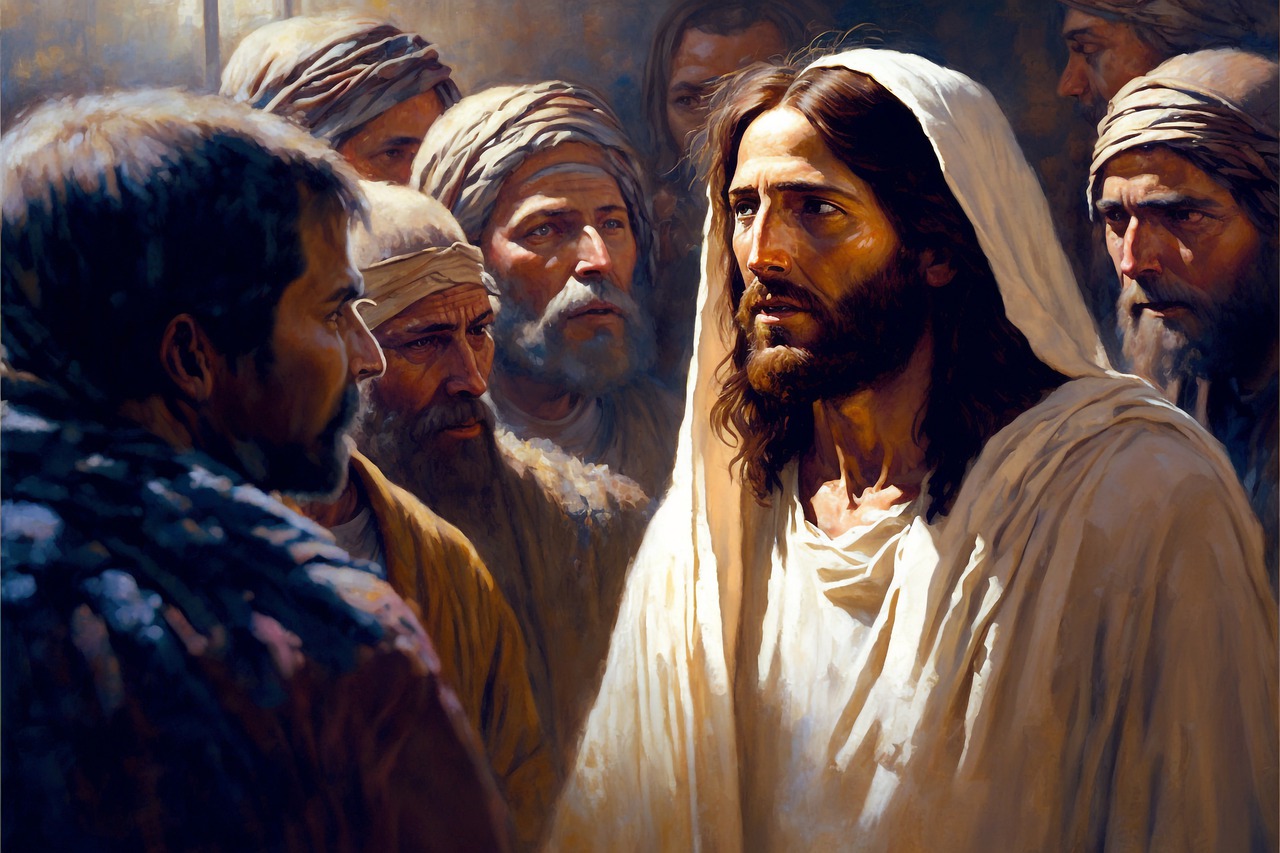Exploring the Prophetic and Symbolic Link between Job 15, Messianic Jesus, and the Gospel
Introduction: Exploring the Prophetic and Symbolic Link between Job 15, Messianic Jesus, and the Gospel
Understanding the connections between Job 15, Messianic Jesus, and the gospel message is crucial in deepening our understanding of the redemptive work of Christ. Job 15 contains prophetic and symbolic elements that point to Jesus and His role in the gospel narrative. By exploring these connections, we gain a richer appreciation of the Old Testament’s role in foreshadowing the coming of Christ and the significance of His work for humanity.
One example of the prophetic and symbolic link between Job 15 and Messianic Jesus is Job’s longing for a Mediator, Advocate, and Redeemer during his trials. In Job 15:22, Job says, “For I know that my Redeemer lives, and at the last he will stand upon the earth.” This statement reveals Job’s anticipation of a Mediator who would deliver him from suffering and bring him face to face with God.Job recognizes the need for someone to plead his case with God and longs for the day when he will see God in the flesh. This longing for a Mediator aligns with the role of Jesus as the ultimate Mediator between God and humanity. Jesus is the Redeemer who delivers us from the power of sin and brings us into a restored relationship with God.
Job 15: Summary and Analysis
In Job 15, Eliphaz delivers a scathing response to Job, criticizing his supposed empty knowledge and unprofitable talk. Eliphaz accuses Job of casting off fear, restraining prayer, and speaking defiantly against God. He asserts the universal impurity of mankind and describes the suffering that comes upon the wicked. This chapter serves as a pivotal moment in the ongoing dialogue between Job and his friends, highlighting the theological implications of Eliphaz’s arguments and their relevance to the overall message of the book of Job.
Eliphaz’s condemnation of Job and his accusations against him raise important questions about the nature of suffering and the response of the righteous. Eliphaz’s belief that suffering is a direct result of wickedness is challenged by Job’s innocence. Job’s response to his friends’ accusations reveals his struggle to understand the reason for his suffering and his desire for a fair hearing before God. This dynamic between Job and his friends sets the stage for the exploration of deeper theological questions and the ultimate revelation of God’s wisdom and sovereignty.
Prophetic Elements in Job 15
Job’s longing for a Mediator, Advocate, and Redeemer during his trials is a prophetic element that points to Messianic Jesus. Despite not knowing who the Mediator would be, Job recognized the need for someone to plead his case with God. He understood that no human righteousness is enough to be acceptable to God and looked forward to his Redeemer delivering him from suffering and seeing God in the flesh. Job, in his innocent and righteous suffering, serves as a type of Christ, foreshadowing Jesus’ sacrificial, intercessory, and redemptive work.
Another example of a prophetic element in Job 15 is Job’s faith in a future Mediator, even though he did not know who it was. Job’s words in Job 16:19-21 express his confidence in a witness in heaven who would vouch for his innocence and serve as his advocate before God. This anticipation of a Mediator aligns with Jesus’ role as the Mediator between God and humanity. Jesus is the one who intercedes on behalf of believers, presenting His righteousness as the basis for our acceptance before God. Job’s faith in a future Mediator demonstrates the hope that believers in Christ have, knowing that Jesus has already fulfilled this role.
Symbolic Connections to the Gospel
Job’s understanding that human righteousness is insufficient to be acceptable to God is a symbolic connection to the gospel. In Job 9:2, Job acknowledges this reality, saying, “How can a man be in the right before God?” This question highlights the fundamental need for a Savior who can provide the righteousness that exceeds our own. This need is fulfilled in Jesus, who offers His perfect righteousness to all who believe in Him. Through faith in Christ, we are made righteous in God’s sight and are reconciled to Him.
Additionally, the temporary physical salvation of Job’s friends by Job himself symbolically connects to Jesus’ eternal spiritual salvation of His followers. In Job 42:10, it is recorded that “the Lord restored the fortunes of Job when he had prayed for his friends.” This restoration of Job’s friends mirrors the salvation that Jesus brings to all who trust in Him. Through His sacrificial death and resurrection, Jesus offers forgiveness, reconciliation, and restoration to all who come to Him in faith. Job’s journey of rejection, suffering, and subsequent exaltation mirrors the rejection, crucifixion, and resurrection of Jesus. The broader message of the gospel is reflected in Job’s quest for hope and redemption amidst his suffering.
Jesus Cleansing the Temple and Job 15
There are connections between Jesus’ cleansing of the Temple and the prophetic elements in Job 15. Jesus’ actions in the Temple symbolize the coming judgment on the Temple and Israel’s unfruitfulness. When Jesus cleansed the Temple, He overturned the tables of the money-changers and drove out those who were buying and selling, declaring, “Is it not written, ‘My house shall be called a house of prayer for all the nations’? But you have made it a den of robbers” (Mark 11:17). This quote from Isaiah 56:7 highlights the purpose of the Temple as a place of worship and prayer for all nations. Jesus’ actions in the Temple and His use of Isaiah’s words draw attention to the need for true worship and righteousness.
The significance of Jesus quoting Isaiah and Jeremiah in the context of the Temple cleansing is further emphasized when we consider the condemnation of the wicked in Job 15. Eliphaz accuses Job of speaking defiantly against God and casting off fear, echoing the wickedness that Jesus condemns in the Temple. Both Job’s friends and the religious leaders in Jesus’ time were guilty of corrupting the worship of God. Jesus’ actions in the Temple and the parallels drawn between the religious leaders’ behavior and the wicked condemned in Job 15 serve as a reminder of the importance of genuine faith and true worship.
The Third Day and the Resurrection
The significance of the third day in the Old Testament and its connection to the resurrection of Christ is another aspect to consider. Throughout the Old Testament, significant events frequently occurred on the third day, such as the sparing of Isaac and the raising of Israel. These events foreshadow the ultimate deliverance and resurrection that would come through Jesus. In Hosea 6:2, the prophet declares, “After two days he will revive us; on the third day he will raise us up, that we may live before him.” This verse, along with other references to the third day, points to the resurrection of Christ as the ultimate fulfillment of this pattern.
The connection between the third day and the resurrection is also highlighted in the New Testament. In 1 Corinthians 15:4, Paul states that Christ was raised on the third day in accordance with the Scriptures. This reference ties the resurrection of Christ to the Old Testament prophecies and patterns. Jesus’ resurrection on the third day serves as the ultimate fulfillment of these patterns, establishing Him as the firstfruits of resurrection. Through His resurrection, Jesus conquered sin and death, offering eternal life to all who believe in Him.
Exploring the Prophetic and Symbolic Link between Job 15, Messianic Jesus, and the Gospel
Recognizing the prophetic and symbolic elements in Job 15 that point to Messianic Jesus and the gospel is of vital importance. These connections deepen our understanding of the Old Testament’s role in foreshadowing the coming of Christ and the significance of His redemptive work. By exploring these links, we gain a greater appreciation for the coherence and unity of the biblical narrative, ultimately leading us to a deeper love for God and a fuller understanding of His plan of redemption. As we continue to study and meditate on the connections between Job 15, Messianic Jesus, and the gospel, may our faith be strengthened and our hearts filled with gratitude for the salvation we have in Christ.
#Job15 #Accusations #Messianicprophecy #JesusChrist #Gospel #Propheticsymbolism #Truth #Biblicalteachings #OldTestament #Spiritualinsight #Scripture #Christianity #Salvation #Redemption #Faith #Deception #Discernment



